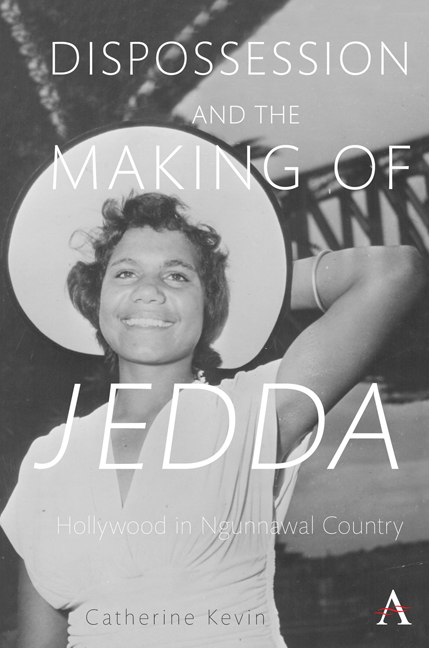Book contents
- Frontmatter
- Dedication
- Contents
- List of Figures
- Acknowledgements
- Introduction: Jedda (1955): Cultural Icon and Shared Artefact of Mid-Twentieth-Century Colonialism
- 1 Financing Jedda
- 2 Hollywood in the ‘Fine Wool Hub’
- 3 Making Jedda
- 4 Viewing Jedda
- Epilogue: Bogolong Memories and the Conceit of Family History
- Index
Introduction: Jedda (1955): Cultural Icon and Shared Artefact of Mid-Twentieth-Century Colonialism
Published online by Cambridge University Press: 23 February 2022
- Frontmatter
- Dedication
- Contents
- List of Figures
- Acknowledgements
- Introduction: Jedda (1955): Cultural Icon and Shared Artefact of Mid-Twentieth-Century Colonialism
- 1 Financing Jedda
- 2 Hollywood in the ‘Fine Wool Hub’
- 3 Making Jedda
- 4 Viewing Jedda
- Epilogue: Bogolong Memories and the Conceit of Family History
- Index
Summary
In 1955 Jedda was launched in Australian cinemas and around the world, starring the young Arrernte Alyawarre woman Rosalie Kunoth, and Melville Islander Robert Tudawali. That year Eric Bell watched the film in the cinema in Yass, New South Wales, while local graziers drove to Sydney's celebrated first screening. The name of the Yass cinema was the Liberty Theatre and the reserve where Eric lived was called Hollywood. These names, evocative of freedom and glamour, belied the racial segregation of the cinema and the discomforts and controls on the reserve that was set on the side of a windy, arid hill and managed by the New South Wales Aborigines Protection and Welfare Boards. Fourteen years after seeing Jedda, Eric was dismayed to read a newly erected plaque in the main street of the Yass Valley village of Bowning, not far from Binalong or Bookham. It plainly stated that the Ngunnawal people, on whose country these villages stood, had been wiped out by an epidemic of influenza in 1846. The local Goodradigbee Shire Council was responsible for the plaque; they also employed Eric's father. The Bells were Ngunnawal people.
The central paradox of this book is the enthusiasm of a pastoral community for a film that directly addressed the continuing-legacy of settlercolonialism – a legacy that was playing out in their own relationships with the local Ngunnawal people at the time of their investment in the film. While the local Goodradigbee and Yass Shire councils and state government agencies collaborated to minimize the visibility of Indigenous peoples and the memory of the colonial violence at the heart of European prosperity, a number of wealthy and high-profile wool farmers actively sought involvement in a film that would bring into focus the aftermath of colonial violence, the visibility of its survivors and the tensions inherent in policies of assimilation and segregation that had characterized the treatment of Ngunnawal people in their lifetimes. Jedda was a five-year project that culminated in the first film starring Aboriginal actors in Aboriginal roles, the first Australian film to be screened at the Cannes Film Festival and the first Australian feature film in colour (Figure 1).
- Type
- Chapter
- Information
- Dispossession and the Making of JeddaHollywood in Ngunnawal Country, pp. 1 - 14Publisher: Anthem PressPrint publication year: 2020



